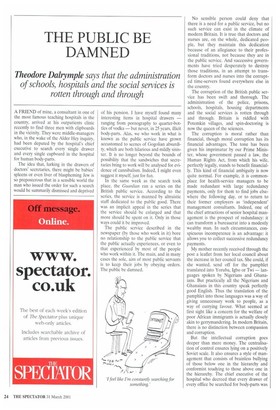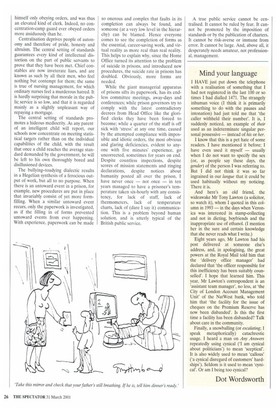THE PUBLIC BE DAMNED
Theodore Dalrymple says that the administration
of schools, hospitals and the social services is rotten through and through
A FRIEND of mine, a consultant in one of the most famous teaching hospitals in the country, arrived at his outpatients clinic recently to find three men with clipboards in the vicinity. They were middle-managers who, in the wake of the Alder Hey inquiry, had been deputed by the hospital's chief executive to search every single drawer and every single cupboard in the hospital for human body-parts.
The idea that, lurking in the drawers of doctors' secretaries, there might be babies' spleens or even liver of blaspheming Jew is so preposterous that in a sensible world the man who issued the order for such a search would be summarily dismissed and deprived of his pension. I have myself found many interesting items in hospital drawers — ranging from pornography to quarter-bottles of vodka — but never, in 25 years, illicit body-parts. Alas, we who work in what is known as the public service have grown accustomed to scenes of Gogolian absurdity, which are both hilarious and mildly sinister. It is no longer beyond the bounds of possibility that the sandwiches that secretaries bring to work will be analysed for evidence of cannibalism. Indeed, I might even suggest it myself, just for fun.
In the same week as the search took place, the Guardian ran a series on the British public service. According to the series, the service is manned by altruistic staff dedicated to the public good. There was an implicit appeal in the series that the service should be enlarged and that more should be spent on it. Only in those ways could it be improved.
The public service described in the newspaper (by those who work in it) bore no relationship to the public service that the public actually experiences, or even to that experienced by most of the people who work within it. The main, and in many cases the sole, aim of most public servants is to keep their jobs by obeying orders. The public be damned. No sensible person could deny that there is a need for a public service, but no such service can exist in the climate of modern Britain. It is true that doctors and nurses are, on the whole, dedicated people, but they maintain this dedication because of an allegiance to their professional traditions, not because they are in the public service. And successive governments have tried desperately to destroy those traditions, in an attempt to transform doctors and nurses into the corrupted time-servers found everywhere else in the country.
The corruption of the British public service has been swift and thorough. The administration of the police, prisons, schools, hospitals, housing departments and the social services is rotten through and through. Britain is riddled with Potemkin villages, and spin-doctoring is now the queen of the sciences.
The corruption is moral rather than financial, though moral corruption has its financial advantages. The tone has been given his imprimatur by our Prime Minister, whose government passed a law, the Human Rights Act, from which his wife, perfectly legally, stands to benefit financially. This kind of financial ambiguity is now quite normal. For example, it is commonplace for health-service managers to be made redundant with large redundancy payments, only for them to find jobs elsewhere the following day, or to return to their former employers as 'independent' management consultants. Indeed, one of the chief attractions of senior hospital management is the prospect of redundancy: it can transform a bureaucrat into a modestly wealthy man. In such circumstances, conspicuous incompetence is an advantage: it allows you to collect successive redundancy payments.
My mother recently received through the post a leaflet from her local council about the increase in her council tax. She could, if she wanted, send off for the pamphlet translated into Yoruba, Igbo or Twi — languages spoken by Nigerians and Ghanaians. But practically all the Nigerians and Ghanaians in this country speak perfectly good English. Thus the translation of the pamphlet into those languages was a way of giving unnecessary work to people, as a way of currying favour. What seemed at first sight like a concern for the welfare of poor African immigrants is actually closely akin to gerrymandering. In modern Britain, there is no distinction between compassion and corruption.
But the intellectual corruption goes deeper than mere money. The centralisation of control ensures lying on a positively Soviet scale. It also ensures a style of management that consists of brainless bullying of those below one in the hierarchy and conformist toadying to those above one in the hierarchy. The chief executive of the hospital who decreed that every drawer of every office be searched for body-parts was himself only obeying orders, and was thus an elevated kind of clerk. Indeed, no concentration-camp guard ever obeyed orders more assiduously than he.
Centralisation deprives people of autonomy and therefore of pride, honesty and altruism. The central setting of standards guarantees every kind of intellectual distortion on the part of public servants to prove that they have been met. Chief constables are now inveterate liars, and are known as such by all their men, who feel nothing but contempt for them; the same is true of nursing management, for which ordinary nurses feel a murderous hatred. It is hardly surprising that morale in the public_ service is so low, and that it is regarded mainly as a slightly unpleasant way of repaying a mortgage.
The central setting of standards promotes a hideous mediocrity. As any parent of an intelligent child will report, our schools now concentrate on meeting statistical targets rather than on the individual capabilities of the child, with the result that once a child reaches the average standard demanded by the government, he will be left to his own thoroughly bored and disillusioned devices.
The bullying-toadying dialectic results in a Hegelian synthesis of a ferocious output of work, but all to no purpose. When there is an untoward event in a prison, for example, new procedures are put in place that invariably consist of yet more formfilling. When a similar untoward event recurs, only the paperwork is investigated, as if the filling in of forms prevented untoward events from ever happening. With experience, paperwork can be made so onerous and complex that faults in its completion can always be found, and someone (at a very low level in the hierarchy) can be blamed. Hence everyone comes to see the completion of forms as the essential, career-saving work, and virtual reality as more real than real reality. This helps to explain why, since the Home Office turned its attention to the problem of suicide in prisons, and introduced new procedures, the suicide rate in prisons has doubled. Obviously, more forms are needed.
While the giant managerial apparatus of prisons sifts its paperwork, has its endless committee meetings, away-days and conferences; while prison governors try to comply with the latest contradictory decrees from Head Office like the glorified clerks they have been forced to become; while a quarter of the staff is off sick with 'stress' at any one time, caused by the attempted compliance with impossible and idiotic orders, the most obvious and glaring deficiencies, evident to anyone with five minutes' experience, go uncorrected, sometimes for years on end. Despite countless inspections, despite scores of mission statements and ringing declarations, despite notices about humanity posted all over the prison, I have never once — not once — in ten years managed to have a prisoner's temperature taken six-hourly with any consistency, for lack of staff, lack of thermometers, lack of temperature charts, lack of (dare I say it) communication. This is a problem beyond human solution, and is utterly typical of the British public service. A true public service cannot be centralised. It cannot be ruled by fear. It cannot be promoted by the imposition of standards or by the publication of charters. It cannot be risk-averse or immune from error. It cannot be large. And, above all, it desperately needs amateur, not professional, management.



























































































 Previous page
Previous page